Choosing the right business bank account can make your business more efficient and save you time and money.
So why don’t more business owners take the time to shop around and compare services?
With so many banking services for business owners to choose from, separating the wheat from the chaff can seem like a mammoth task.
And picking the right financial solution is made even more difficult by the fact that some banks still don’t operate transparently, making it tough to find simple information about their pricing structure online. Moreover, many business owners are put off changing banks because of the often-arduous application process.
Because of this, many business owners simply open a business account with the bank they use for their personal finances. This option is certainly the easiest, but even if a bank is perfect for your personal use, it may not be the best choice for business banking.
While searching around for the best business bank account may seem like a drag, making the right choice can seriously help your company grow.
What to consider before choosing your business bank account
There are a few key factors you should consider while shopping around for the best bank account for your small business, including:
- Fees and charges
- Products and services
- Your future business needs
- Incentives to join or switch
Why should you shop around?
Every business is different and has its own financial needs.
Shopping around to compare deals and services will help you to find an account that meets your business’ needs, so you can reduce costs and keep your books clean. You should also be able to rely on your bank to be a supportive and transparent partner.
11 Of The Best Business Bank Accounts in the UK

Below you’ll find 11 excellent business bank account options, great for all kinds of small businesses. We’ve broken these down to highlight what makes them different from each other so that you’ll have an easier time deciding which one to go with.
Tide Business Current Account
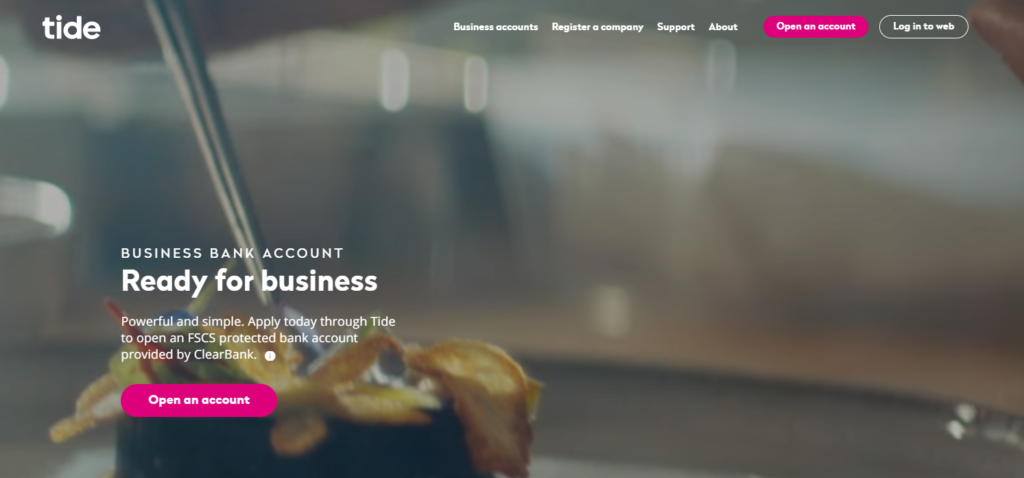
Within a year of its launch, 1 in 12 business current accounts opened in the UK was with Tide. The account tags income and expenditure with labels to make accounting easy and can be used to create and pay invoices. There are no monthly fees with Tide and normally, it costs 20p for transfers.
- For limited companies, partnerships, sole traders and charities.
- If you open a business account with Tide through UENI, you’ll receive £75 and 1 year of free bank transfers.
Barclays Start-Up Business Account
Barclays start-up offer is ideal for small businesses just starting out.
Features:
- Banking app with free invoicing feature
- Initial 12 months free
- Access to business advisors
- Two pricing tiers are available, depending on whether your business mainly takes payment in cash or via debit cards and electronic payments.
Best for:
- Limited companies and partnerships
- Charities
Things to note:
- As of 11th September 2021, monthly fees will increase from £6 and £6.50 to £8 and £8.50
Santander Business Current Account
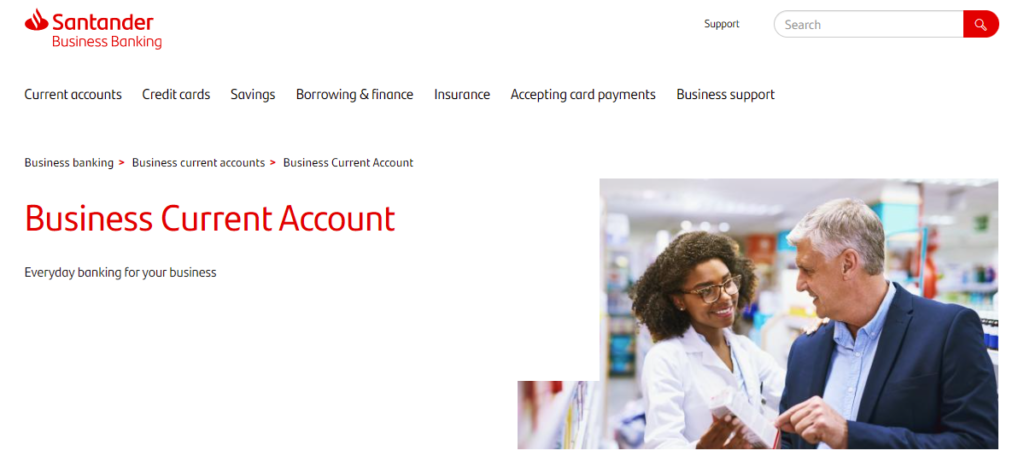
This Santander account is ideal for new small- to medium-sized businesses’ day-to-day banking needs.
Features:
- Initial free period of 18 months
- £7.50 monthly fee after a free period
- Overdraft limit up to £25,000
- Online banking, Santander ATMs, and post office services
Best for:
- Limited companies or partnerships with two directors or partners
- Businesses with an annual turnover of £2 million or more
Things to note:
- As of November 2021, overdrafts will be subject to 10% EAR (variable).
Lloyds Bank Business Account for Start-ups
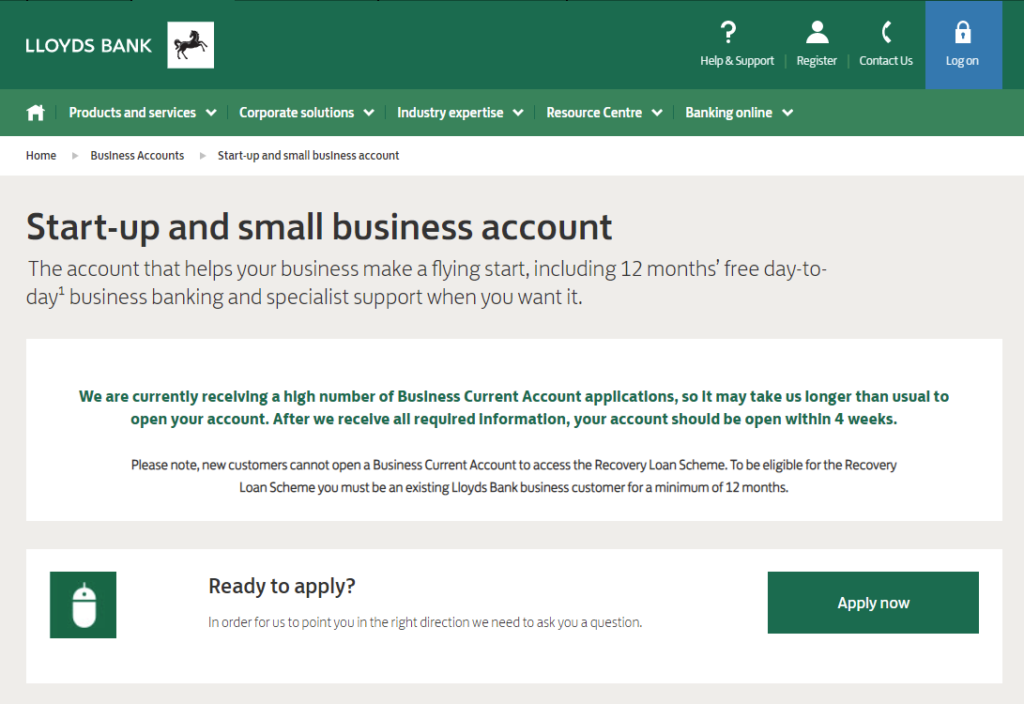
If you have straightforward banking needs, Lloyds provides an accessible and easy-to-use start-up account.
Features:
- 12 months free banking
- Access to the business management team
- Free electronic payments
Best for:
- Businesses under £3 million annual turnover
- Sole traders, partnerships, and single director companies
Virgin Money Business Current Account
New businesses (or account switchers) receive 25 full months of free banking with this account.
Features:
- 0.35% cash back on debit card transactions
- Business discounts with selected merchants
- Free money management tools, including:
- Financial forecasting
- Cashflow projections
- Invoice generation and management
- Business spend tracking
Best for:
- Businesses with less than £6.5 million annual turnover
Things to note:
- Monthly fees are £6.50 per month after free period
- There is an annual cash transaction limit of £250,000
- After the free period, the monthly fee increases to £7 per month, but electronic payments remain free
HSBC Business Current Account for Start-Ups
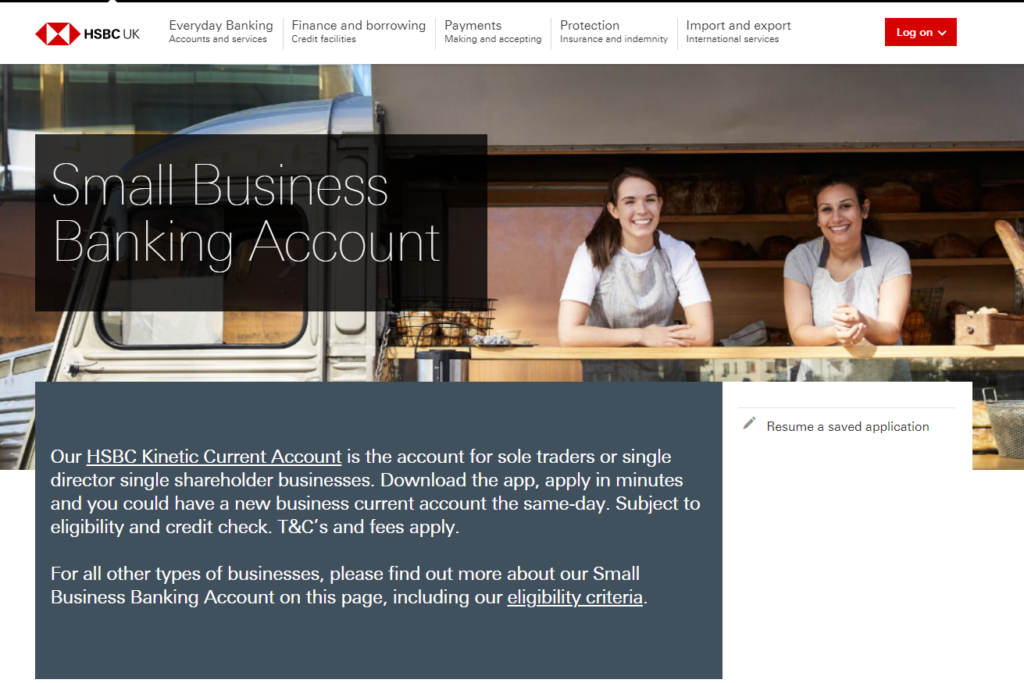
This bank account is particularly suitable if your business has borrowing needs of up to £100,000.
Features:
- Free banking for the first 12 months
- Simple overdraft application
- Scan and deposit cheques directly on the business banking app
- Unlimited number of cheques
- Sync with Sage for seamless accounting
- Foreign currency accounts for £8 per month
Best for:
- Limited companies, partnerships, sole traders, and charities
- Businesses up to £2 million annual turnover
Things to note:
- Monthly fee increases to £8 per month after the first 12 months
- There is a maximum of £2,500 daily cheque deposits—each individual cheque cannot exceed £500
The Cooperative Bank FSB Business Current Account
This account is a simple and straightforward business account ideal for members of the Federation of Small Businesses.
Features:
- Includes a business savings account
- Overdraft access
- Online business banking
- Free deposits of up to £2000 cash per month
- Free cheque payments
Best for:
- Sole traders, partnerships, limited liability partnerships, and limited companies
- Businesses with up to £1 million turnover
Things to note:
- If you’re not a member of the Federation of Small Businesses, you can avail yourself of their Business Directplus account. More on this below.
NatWest Business Current Account for Start-ups
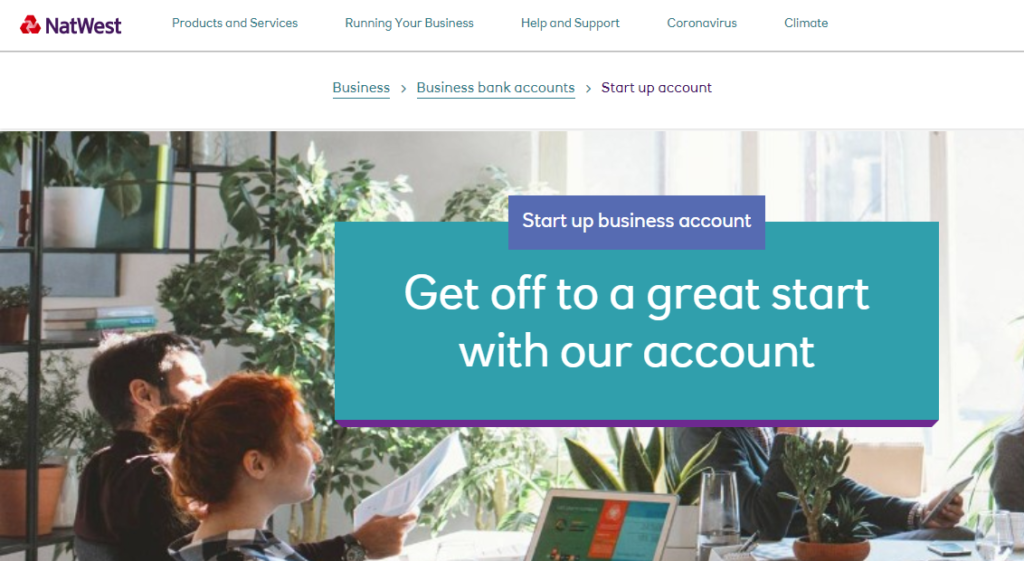
NatWest’s Tyl payment solution makes this start-up bank account an attractive option for businesses with a busy cashflow, such as high street stores and e-commerce websites.
Features:
- Simple, straightforward, and quick online application
- 18 months free banking
- Integration with FreeAgent accounting software
- Next-day payment on transactions through Tyl payment solution
- Overdraft available
Best for:
- Businesses trading less than one year
- Turnover under £1 million
Things to note:
- After the free period, standard tariffs apply, but there is no minimum monthly fee
Danske Bank Danske Small Business
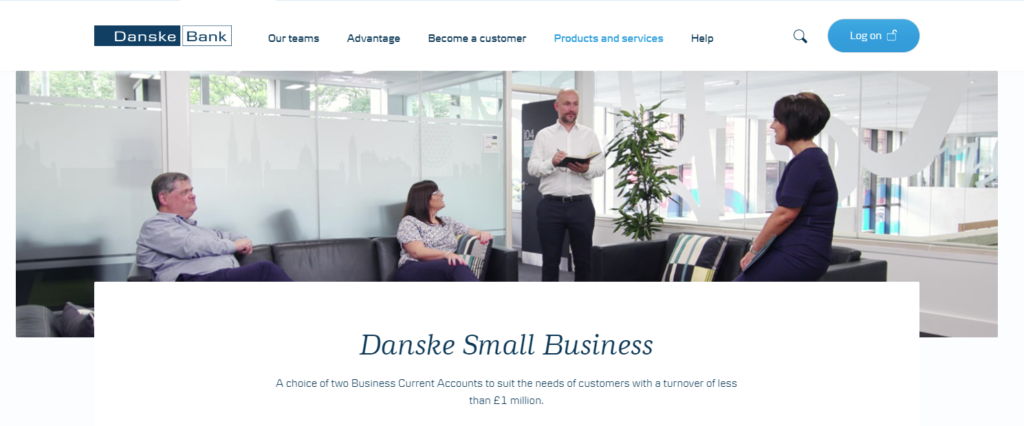
Danske Bank is an excellent option for small- to medium-sized businesses with two different business current account options.
Features:
- Danske Small Business
- Combines branch-based and online banking
- £12.50 monthly fee
- Up to five accounts
- Lower lodgment, cheque, and cash withdrawal fees
- Danske Small Business Digital
- Combines post office and online banking
- £7.50 monthly fee
- One account only
- Free online payments and automated transactions
- Both account types:
- Branch service
- Mastercard business debit card
- Post office service
Best for:
- Businesses with turnover of less than £1 million
- Limited companies, partnerships, sole traders, and charities
Things to note:
- As of 1st October 2021, fees will increase to £14 per month for Danske Small Business and £9 per month for Danske Small Business Digital.
Managing your online business transactions
As our world becomes more and more digital, an increasing number of businesses need a way to accept orders and payments online via their website.
At UENI, we help you create a beautiful, simple-to-use website so you can easily sell products online, accept payments, manage orders, and customise your shipping methods. So start your website-building journey today with our full support and expertise.
What information do you need to open your business bank account?
Opening a new business bank account can require a lot of paperwork and collation of documentation.
To make the whole process simpler and to offer some clarity to business owners, Finance UK have worked with the providers of UK business banks to agree on the basic information that is required to open a business bank account.
Depending on the status of the business and which bank provider is being applied to, business owners may be required to bring some different or additional information. Finance UK has produced a helpful online guide for businesses looking to open a new business bank account.
That guide can be a great tool to help you understand what sort of questions you may be asked when opening a business account, as well as the documentation you will be provided to share.
How to choose a business bank account
The services and products offered from one bank to the next vary greatly when it comes to opening a business account, so doing your research and seeing what is on offer is essential.
Here are six things to consider when choosing which bank is right for you and your business.
1. Choose services and products relevant to your needs
First and foremost, you’ll need to think carefully about your business plan and your business needs.
As well as a current account, what other products or services will you need, either in the short-term or further down the road? Avoid being short-sighted and thinking only of your current situation. Instead, consider your forecast for the business – in other words, where you hope it can get to.
While it can be a bit difficult to think further than the here and now, you’ll need to make sure you identify the bank that offers a product that best aligns with your needs. After all, you certainly don’t want to outgrow your bank in a year or two and have to start the whole process over again because you didn’t think ahead.
2. Research the fees, charges & other unpleasantness
Business bank accounts operate differently from personal accounts, and they often incur charges for transactions as well as a monthly fee.
Some of the actions you may be charged for include making deposits, sending electronic payments, transferring money, and withdrawing cash.
Review which actions your business performs most frequently and pay close attention to the relevant fees – they add up.
Many banks will offer a fee-free period when you first join but make sure you don’t evaluate the banking product on this basis; carefully consider whether this offering will still be the right option for your business after it’s no longer free.
3. Consider the new kids on the block: online banking and apps
Online banking and mobile apps are unmatched when it comes to convenience and managing your finances on the go.
Make sure you investigate the services that are available via online banking, if any, and whether they facilitate the actions that you are likely to be performing regularly.
4. If you already have a business bank account, see if another bank offers an incentive to switch
If you already have an existing business bank account, look out for business account ‘switcher’ deals.
Some banks offer fee-free periods to business owners looking to switch their banking service providers. Remember, because banks want to encourage you to begin using their services, switching accounts is made as hassle-free as possible.
Everything is now usually handled behind-the-scenes between banks on your behalf, so you won’t have to deal with the logistics of moving your account to a new financial institution.
5. Look into your credit rating
Your credit score will have an impact on your options have when it comes to choosing a business bank account. So it’s best to know your score before you start shopping around.
If your score isn’t so great at the moment, look into each bank’s credit requirements early on – that way you won’t waste your time on an account you won’t qualify for.
While many of the larger banks may not accept businesses with low credit scores, some of the up-and-coming challenger banks (Like Monzo or Revolut) and online banks don’t even require a credit check to join, making them excellent business bank accounts for bad credit.
6. Meet the bankers at a branch near you
If you’ve narrowed your list of potential banks down to a few contenders and you’re still struggling to decide, making a telephone call or arranging a face-to-face meeting often helps. You’re bound to have a few unanswered questions at this stage anyway. Plus, speaking to an advisor should give you a feel for how the bank operates and what level of service you can expect.
When comparing business bank accounts, check out these two resources
While it’s notoriously difficult to find impartial comparison websites for banking services (which is why we’ve written this article), there are a few resources out there that can help you gain some insight.
1. The Business Banking Insight survey
The Business Banking Insight survey and website was launched by the Chancellor of the Exchequer and is run by the British Chambers of Commerce and the Federation of Small Businesses. At the time of writing, 23,536 small and medium-sized businesses have been surveyed, although this is being added to regularly to keep the information current.
The survey results help businesses obtain impartial insight into the business banking options available to them. Customers surveyed rate their business bank in key areas including charges and fees, transparency, and ease of contact.
2. The Better Business Finance
The Better Business Finance website was set up by Barclays, HSBC, Lloyds and Santander and is managed by the British Bankers’ Association (BBA).
The website provides impartial advice and support to businesses looking for a bank account or financing.
Want More Options? Here Are More Excellent Business Bank Accounts:

Best business bank account for small to medium sized businesses with a turnover of up to £2M
Metro Bank Business Current Account
The Metro Bank Business Current Account is a relatively new service that is already being rated highly by customers surveyed for the BBI’s independent research. The Metro Bank have high street stores that are open 7 days a week, making it easy to get support when you need it. It is simple to open an account; small business owners can walk into a store (or hop online) and open an account without the need to book an appointment. If your balance stays above £6000 for the month then the monthly fee will be waived.
- Fee of £6 p/m.
- For limited companies, partnerships, sole traders and charities.
The Cooperative Bank Business Directplus
The Co-op’s Business DirectPlus account offers new customers who meet the qualifying criteria free banking for 18 months.
- £5 p/m after initial free period.
- For limited companies, partnerships, sole traders and charities.
Best account for businesses with a turnover of more than £2M

Danske Bank Danske Large Business
Danske’s large business bank account is also available to relationship managed customers in Business Centres and Corporate Banking.
- For limited companies, partnerships and sole traders.
HSBC Large Business Bank Account
HSBC Large Business Bank Account customers will receive support from a dedicated relationship manager with commercial expertise. The account also offers two different banking solutions, allowing you to choose the one most suited to your requirements.
- Fee of £5 p/m.
- For limited companies, partnerships, sole traders and charities.
Best business banks for making-a-switch deals
HSBC Business Current Account for Switchers
HSBC offers switchers 12 months of free banking. Once the fee-free period is over there is also a choice of two different tariffs available and their Best Tariff Promise means your account will be regularly reviewed to make sure you’re on the cost-effective tariff. The account also offers access to finance and borrowing.
- Fee of £5.50 p/m.
- For limited companies, partnerships, sole traders and charities.
Royal Bank of Scotland Business Current Account for Switchers
Businesses that switch to RBS’s business current account will receive 2 years of free banking. The account offers the option to apply for a fee-free overdraft of £500 and there are no arrangement fees on fixed rate business loans.
- Fee of £5 p/m.
- For businesses with a turnover of up to £2m.
- For limited companies, partnerships, sole traders and charities.
Best business banking solution for freelancers

Coconut was created with freelancers and self-employed people in mind. You can apply now to join the waiting list for the beta version. The introductory service, called “Side Hustle” costs £3.60 p/m while the more fully-featured version, called the Professional plan, costs £12 p/m.
The account tracks and sorts income and expenditure to estimate the amount of tax due. It also includes invoicing, VAT management and a handy option to share information with your accountant.
The best business bank accounts for bad or poor credit
Cashplus Business Current Account
It is quick and easy to instantly apply for a Cashplus account online, no credit check, paper forms or interview are required.
- Annual fee of £69.
- For limited companies, partnerships, sole traders and charities.
CardOneBanking Small Business Account
There is no credit check required to open a CardOneBanking Small Business Account and you won’t incur any charges for late payments or overdraft fees.
- £55 application fee.
- Minimum monthly fee of £12.50.
Once you choose a bank, continue to re-evaluate your services
Over time as your business grows and changes you may find that your bank account can no longer fulfil all your requirements. It’s important to stay informed about new banking products, services, and features so that you can be confident that you’re still receiving the best service for your business.
Business owners shouldn’t feel reluctant to make the switch if their current business account stops being competitive as switching services now make the process simple and undisruptive. The right business bank account will make your job easier and your business more efficient, so it’s well worth taking your time to find the right match.





